POWER
PLAYER
Hayley Wickenheiser is a force. At 44, she’s a four-time Olympic gold medallist, a Hockey Hall of Famer, an assistant GM of the Leafs—and, as if that weren’t enough, a medical doctor. She has a few things to say about failure, women in sports and hockey’s major sexism problem.
by stéphanie verge
portraits by ian patterson
January 23, 2023
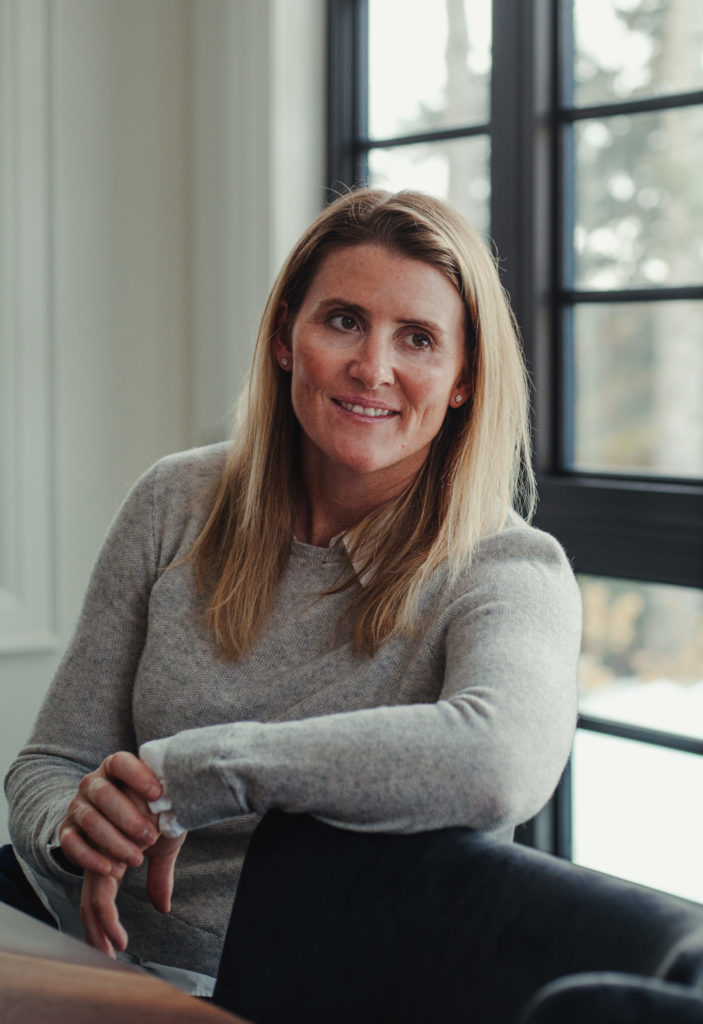
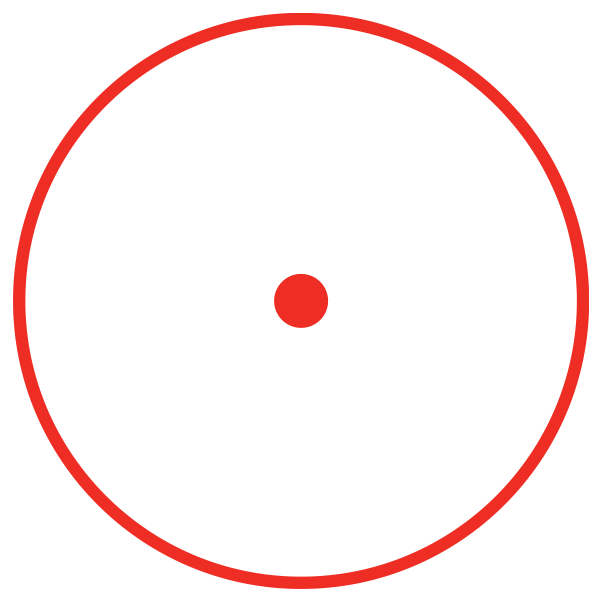
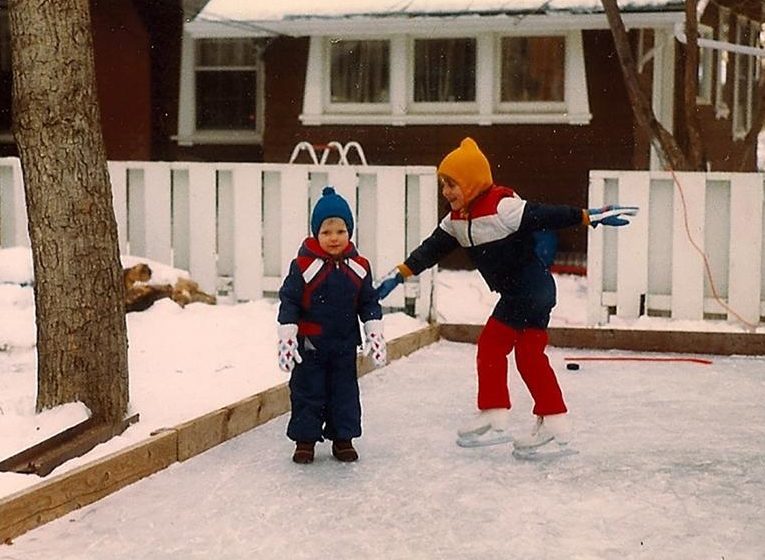
Wickenheiser has called the backyard skating rink her “first love”
Hayley Wickenheiser has been skating almost as long as she’s been walking. She honed her skills on a backyard rink flooded by her dad in the tiny hockey-obsessed town of Shaunavon, Saskatchewan. Late-night games of shinny at home led to lacing up with the boys (and having to change in the boiler room) and then to joining the women’s national team, where, at 15, she was a good decade younger than most of her teammates. Despite the sacrifices hockey involved, Wickenheiser knew it was for her—a certainty on clear display in her memoir, Over the Boards, and in a new documentary called Wick.
Wickenheiser’s 23 years as a pro are unparalleled in hockey: she is the first woman to score a goal in a men’s professional league (in Finland), and she has taken part in six Olympics (five for hockey, one for softball), winning four gold medals (twice as MVP). After such a storied career, the speaking circuit and coaching are the usual go-tos for a sports star. But not for Wickenheiser, who, since hanging up her skates in 2017, has managed to graduate from medical school while simultaneously climbing the ranks of the NHL front office.
These days, she’s pulling double duty as a resident in family medicine at a Toronto hospital and an assistant general manager of the Maple Leafs. Throughout it all, she advocates passionately for girls’ and women’s hockey with WickFest, a festival that hosts 7,000 players each year. Here, a conversation about the slowly changing face of hockey, her secret to letting off steam and how this western girl finally learned to love the Leafs.
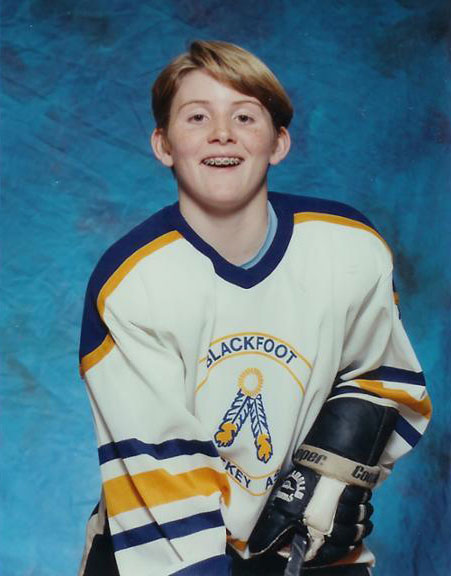
As a player on boys’ teams, Wickenheiser cut her hair short to fit in
In 2020, when lockdown hit, a common reaction was to take up breadmaking. But you went and wrote a book: your memoir, Over the Boards, was released in October 2021.
I had already committed to the book, and then I suddenly had more time on my hands. I started working on it verbally—I would talk into my phone as I drove to and from rinks and hospitals. Writing it wasn’t something I really enjoyed, per se.
So why did you say yes?
I don’t know. That is a good question!
You’re an introvert, but you also took part in the filming of a documentary called Wick, which is all about, well, you.
I do understand that what I have done in life is unique, and I thought that my story could inspire female athletes and, in particular, young girls. I wanted them to know that things can be hard but they can also get better. I have insights to share, which is why my book is built around lessons learned as opposed to just being the big boring story of my life.
Each chapter ends with takeaways for the reader, like “Focus on winning, but don’t ignore the possibility of losing.” It’s a tidy way of telling a story.
Sport is regimented—it’s based in routine and process. You know that to get from A to B there are certain things you have to do. I enjoy that. A big part of sport is that you lose a lot, sometimes more than you win. So you’re constantly evaluating what went wrong and what went well and then trying to do better. Even when you win, you’re still chasing improvement, for yourself and for your team.
You’re a four-time Olympic champion, a medical doctor and an assistant general manager for the Leafs. Aren’t there days when you look at yourself and think, No self-improvement required?
Oh, yeah. Last night—when I was 18 hours into a 26-hour shift at the hospital—I ran out of my usual food, went to the vending machine, grabbed a bag of spicy dill pickle chips and that was that. And they were good.
You’re based out of a hospital here in Toronto, where you’re doing a residency in family medicine. You’re also working toward a specialty in emergency medicine. Emergency departments are a mess in Canada. Why choose something so fraught?
The last seven or eight years that I was playing for the women’s national team in Calgary, I would head to a nearby hospital after games to shadow a doctor friend of mine in the ER. I knew right away that it was my kind of medicine. It’s like hockey: it’s very active, and it’s never the same thing twice. You might see an ear infection and then in the next second you’re doing a resuscitation. I also like the lifestyle: it’s shift based, and when you leave the hospital, you have nothing else to deal with—no overhead, no staff. I need that in my life because I also have hockey stuff going on.
In Wick, you talk about playing boys’ hockey and the pushback you got from coaches and parents and other players. You say, “When I step on the ice, I better be good or they’re going to say, ‘Girls don’t play hockey. You can’t play.’ One day, I’m going to look back and I’m going to shove it down their throats.”
I can’t believe they used that line! I mean, of course they did.
It’s remarkably unequivocal. Were you always so confident?
I was always determined as a kid. I faced so much adversity—even when the negative reactions from other players and their parents were subtle, I could still tell that I wasn’t welcome. People put up with me because I was good on the ice. My protective mechanism was to build a mental and physical wall around myself. I learned to bury my feelings because I knew no one wanted me around. I tried to be invisible with my emotions. No one cared except my parents, and even they are “suck it up” kind of people.
You’ve talked about doing everything not to cry or show vulnerability when you lost a big game or got hurt on the ice. When you entered medicine, that changed. What happened?
Athletes are actors. If you’re injured or sick or scared, you project that you’re not. Medicine, however, is so human. And, after so many years of burying things, I started feeling human again. When there’s a death or a birth, you’re in it with your patients.
I recently saw a man in the emergency department with a brain tumour, and his teenage son was so upset. He collapsed in my arms, and I cried with him. He ended up losing his father weeks later. Those tragic moments really get to me, especially when there are kids involved.
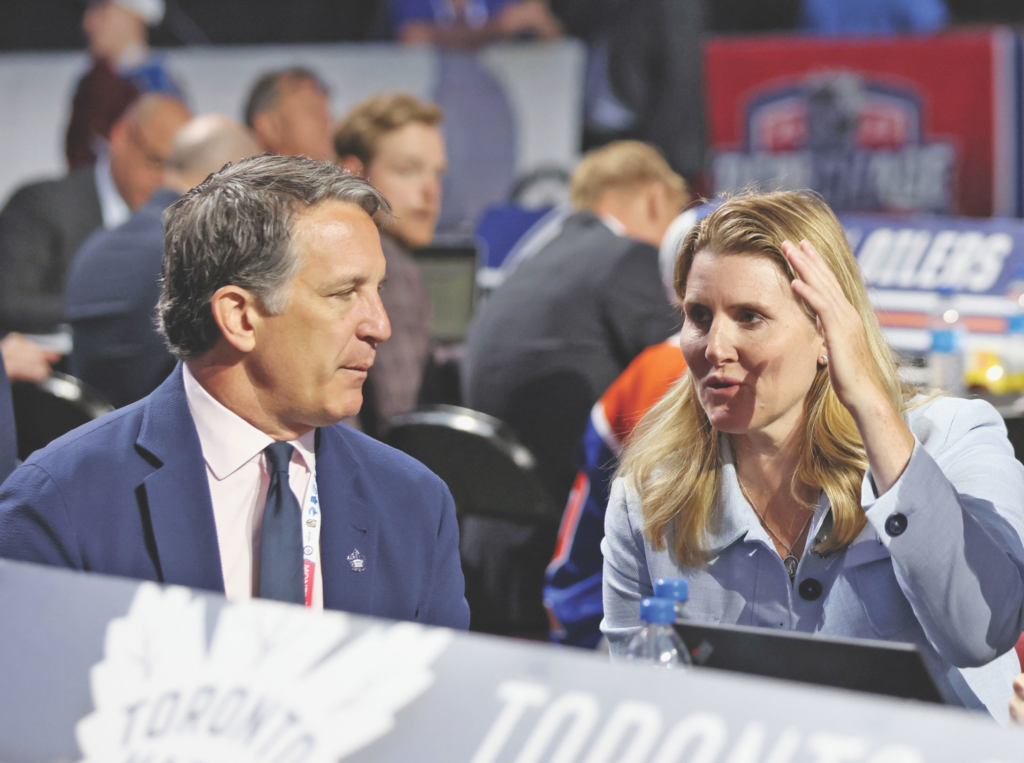
Talking prospects with Leafs president Brendan Shanahan on NHL draft day
“My younger self would have called me a traitor. As a die-hard western girl, I hated the leafs. But wearing this logo feels natural now. Toronto has grown on me”
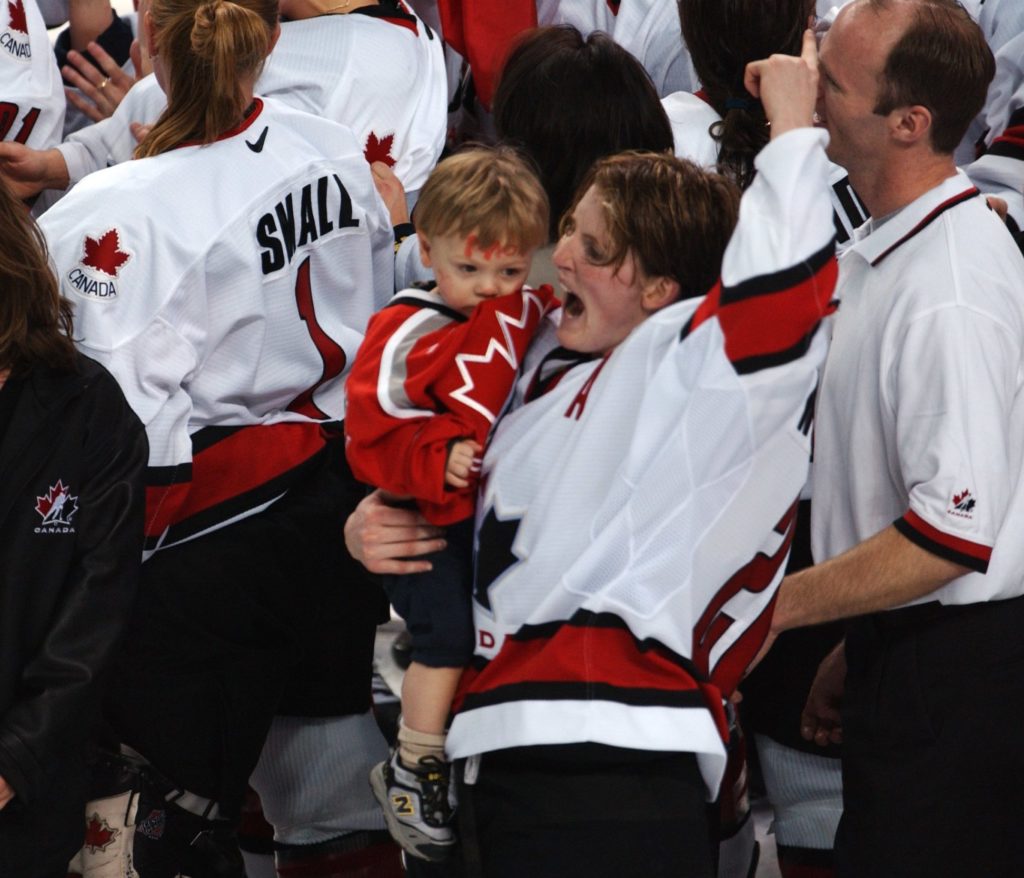
Wickenheiser celebrating her first Olympic gold with her teammates and her son
When you were 21, you adopted your son, Noah. In the past few years, there’s been more conversation around how female athletes can succeed in both sport and motherhood. Back then, did you ever worry that having a newborn would negatively affect your career?
I never had a second thought about becoming a parent. I knew that Tomas, my partner at the time, and I would figure it out. Plus, I had my parents, brother and sister for support. I used to joke that it was a really easy pregnancy and that I didn’t even need to take nine months off. In reality, Noah was born three months premature and was so sick for the first year that I probably lost those nine months anyhow. But being his mother has always felt like a gift.
Now he’s grown up and you’ve moved from the Prairies to Toronto. As a kid, you cheered for the Oilers, and here you are wearing blue and white. Would young Hayley put you in the penalty box for that?
She would definitely call me a traitor. As a die-hard western girl, I hated the Leafs. But wearing this logo feels natural now. Toronto has grown on me, too—everything except the traffic.
You were on the front lines in early 2020, when the city saw one of its first presumptive Covid cases. What do you remember from that day?
A lot of uncertainty. Covid was suspected, but we didn’t have PPE, and the attending physician was hesitant to go in without an N95. I remember, in my naïveté, thinking, First of all, what’s an N95? Secondly, what’s the fuss about? Once I understood the gravity of the situation, I thought, Then why don’t we have enough PPE?
A couple of months later, you put a call out to your Twitter followers to address the urgent need. In a few months, you and over 100 volunteers raised more than $2.3 million and delivered more than three million pieces of PPE across the country. Did you expect that level of response?
Not initially. But, once Ryan Reynolds joined the effort, I knew we’d get a lot of eyes. I think people wanted to help and engage—and they didn’t have much else going on.
It was that or baking sourdough.
Exactly.
You met Reynolds in 2014, when you both received a star on Canada’s Walk of Fame. Did you click right away?
Yes, over our mutual dislike of awards ceremonies. He came over and introduced himself to me and my guest, Grace Bowen, a nine-year-old hockey player with osteosarcoma whom I’d met at SickKids. Grace died a few months later, but that evening we all spent time together. The next day, Ryan messaged me. He said that Grace had inspired him to become more involved with SickKids, which he really has. We’ve stayed in touch ever since.
Now you have someone to hang out and complain with at awards shows.
I don’t go to the ceremonies he goes to!
The Overachiever
Part 1 of 2
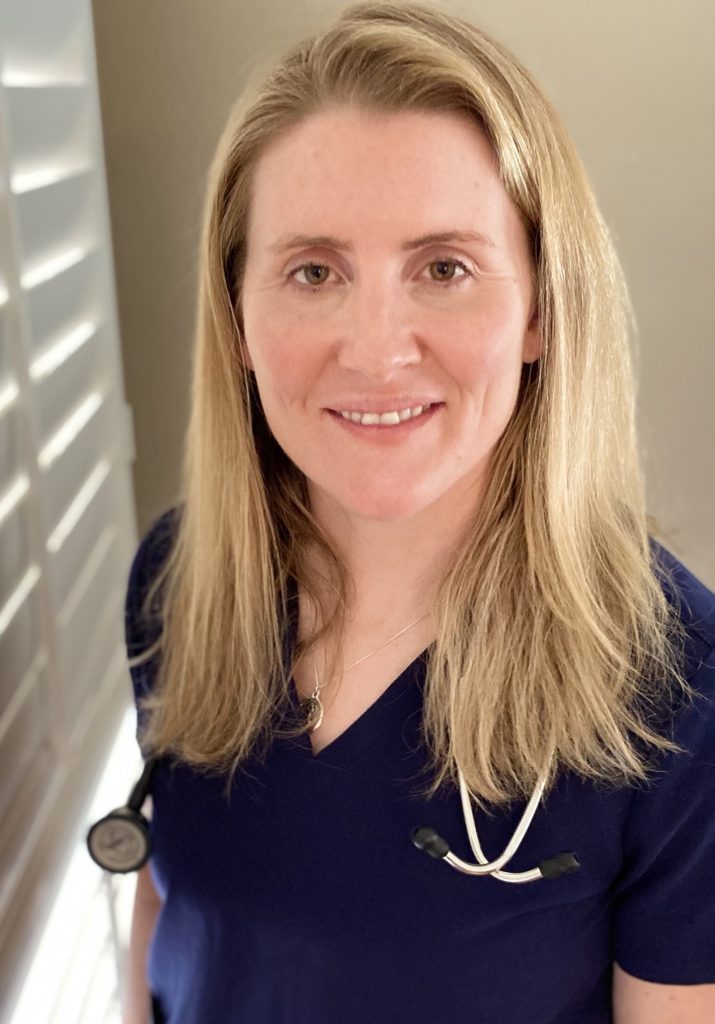
To Wickenheiser, working in the ER is like playing hockey: every day is different
To succeed in hockey and medicine, what’s most important: quick thinking, quick feet or a quick mouth?
Quick thinking. Keep your mouth shut and your head down. I don’t like to procrastinate, so it doesn’t take me long to make a decision.
Have your quickfire decisions ever gotten you into trouble?
I’m sure they have. In medicine, it’s called being an early closer. You’ll look at a situation and you’ll think, Oh, it’s definitely this, and you can miss things. I like to move quick and work fast, but that can be detrimental. So I need to always check myself.
In med school, you found sitting still so hard that you’d pace at the back of the lecture hall. How do you counter the lack of sleep and often unhealthy lifestyle that comes with being a resident?
When I started in medicine, I promised myself two things: I would get sleep and I would continue to train and be fit. It’s not always possible—I only got six and a half hours of sleep today—but I really carve out the time. I cut out other things, like socializing. Because how can I talk about health to other people if I’m not healthy? You can’t ask someone to do something you’re not willing to do yourself.
Do you have any vices?
Coffee. If it’s hot and decent, give it to me.
Before you started drinking coffee, your vice was watching and rewatching hockey tapes. Were your friends ever like, “Can we just rent a movie from Blockbuster?”
No, because I would fall asleep five minutes into any movie—they are a natural sleeping pill for me. And you have to watch hockey to get better. That’s what I tell little girls who ask me for advice. When I was a kid, I was watching Don Cherry’s Rock’em Sock’em videos and tapes of the 1972 Summit Series. You have to love the game to get better.
No one would question your love of the game, but what happens when the game doesn’t love you back? Many athletes from marginalized groups—whether they are Black or Indigenous or queer or women—have spoken out about how toxic sports culture can be in Canada.
Kids shouldn’t grow up thinking that having a girl or a Black player on their team is abnormal. And we should be introducing hockey to populations other than white, male, middle-class-to-wealthy ones. That’s the game of hockey in this country right now. It’s become so expensive and so inaccessible. The women’s side of the game has done a good job of breaking down barriers, but it’s required a lot of hard work by a lot of people.
Hockey Canada has come under fire for how it’s dealt with sexual assaults by its players and for using registration fees to pay settlements. You, like many others, have called for massive change within the organization. What should that look like?
We need to gut the entire organization and start with a new leadership team. We need to bring in people who are visionary, who understand the game and who are willing to make tough decisions. And there has to be zero tolerance for the kind of stuff we’ve seen recently. Zero tolerance.
There are rumours that you’re on the list to head up Hockey Canada. Here’s your chance to get ahead of things: Would you take the job?
I don’t think so. I would listen. I would consider. But I love what I’m doing with the Leafs. I had a conversation with Leafs president Brendan Shanahan a little while ago where I told him just how much I loved the work and the environment. For one of the first times in my hockey career, the off-ice stuff hasn’t been so hard. It’s nice to just do my job.
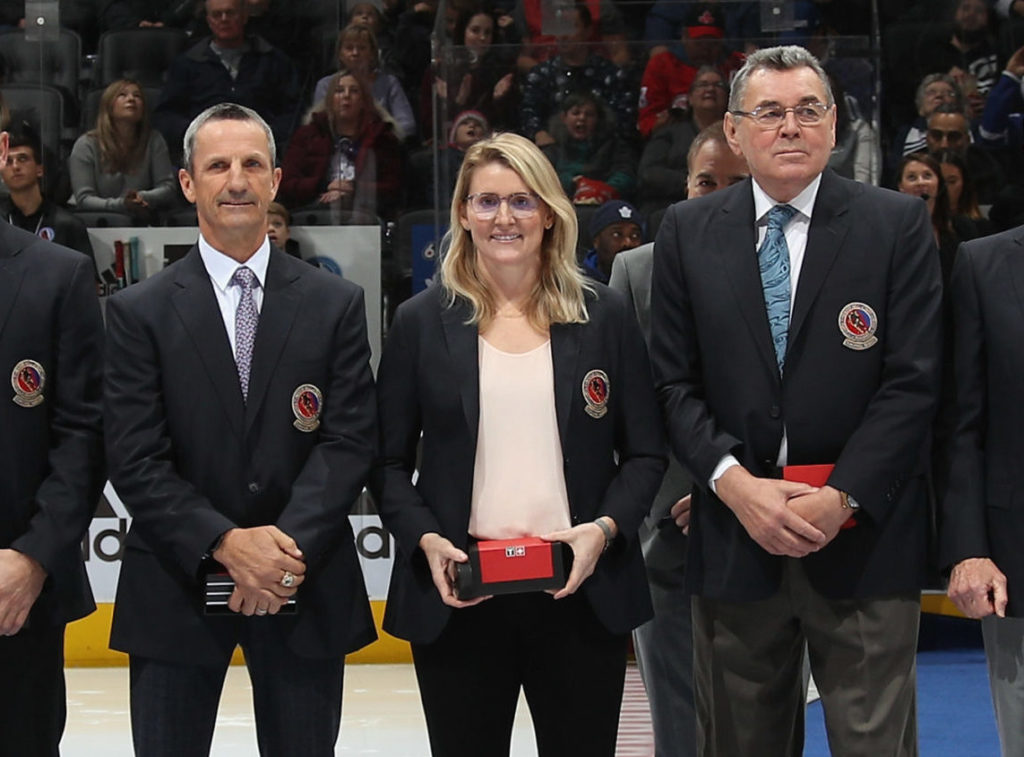
Wickenheiser is one of only nine women inducted into the Hockey Hall of Fame
“Hockey is so expensive and so inaccessible. The women’s side of the game has done a good job of breaking down barriers, but it’s required a lot of work by a lot of people”
What do you love so much about being an assistant general manager?
I’ll share a moment with you from this summer. I was at the Ford Performance Centre, which is the team’s practice facility in Etobicoke. We can run three rinks at a time for development work, and there were 27 players in the space—from prospects right up to current Leafs. Every inch of the ice was taken up by our staff working with players. I remember thinking, This is just so cool. Whether they’re trying to get to the NHL or they’ve been in the league for years, they’re still trying to get better. And I get to be around that. I get to help them find their edge.
You’ve taught hockey skills to young women in rural India and run practices for teams in North Korea. What makes hockey such a universal language?
You can go anywhere in the world, put a puck on the ice and body language will say it all. Those girls in India have branched out and are now doing cool things in places where you would never think hockey was a thing. They’ve gone on to work as teachers in schools and are doing sports camps through the government. They run clinics for kids who’ve never skated. And they’ve taken on members of the military, who were hogging all the good patches of outdoor ice, and have beaten them at their own game.
You’re known worldwide as an elite athlete. What’s the least jock-ish thing about you?
I play the piano. I used to play well, but I’ve lost some of my skills—I’m just okay now. My dad taught PE, math and science, but he was also a drummer in a rock band when I was growing up, so we always had music around. Music helps me relax.
Let’s talk about one of your more unorthodox calming tools: the freak-out session. When you’re stressed, you give yourself 20 minutes—with a timer—of unfettered worrying. That wouldn’t work for me.
It’s taken years, but I’ve become pretty good at it. I can stop the spiralling by telling myself to calm down, move on and come back to whatever is bothering me later. Otherwise I would just be consumed by things all the time. I knew I had to find a way to control the anxiety, the worry and the fear. The freak-out sessions were a way to settle myself down.
When did you start doing them?
Following the Nagano Olympics, in 1998.
Team Canada lost gold to the Americans there, which devastated you. You credit your long-time coach, Wally Kozak, for helping to lift you out of your depression.
He passed me a note that said, “A gold medal is a wonderful thing, but if you’re not enough without it, you’ll never be enough with it.”
Do you still have the note?
I do. It’s folded up into a tiny square in my wallet. I always have it with me.
Lovers of Jamaican Cinderella stories will recognize his message from the bobsledding classic Cool Runnings.
I only found that out years later.
The Overachiever
Part 2 of 2
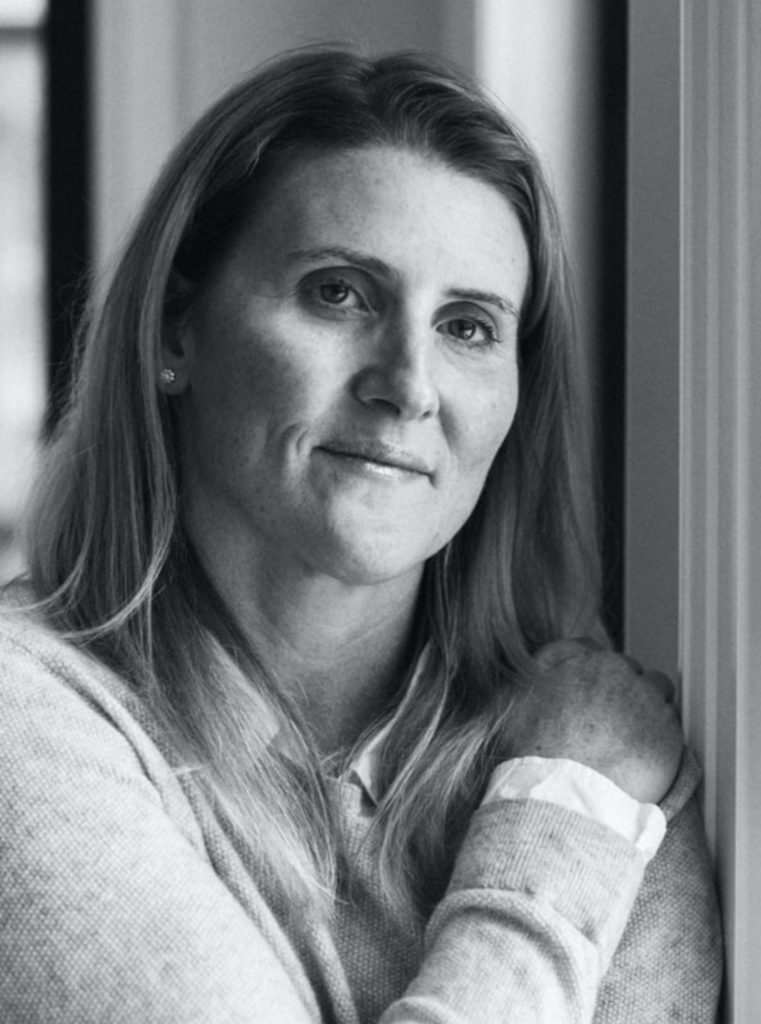
Earlier you talked about off-ice challenges. Compared with other professional sports, like basketball and football, hockey has fewer women involved in development and coaching. Why is that?
Hockey is the last professional sport to evolve. It’s coming along, but it still has an old-school mentality. I think it attracts a certain type of person, and it’s a very small world. People tend to be hired and fired and rehired and recycled a lot within the game and throughout the league. I think we have to broaden the opportunities and the people we’re looking at when we’re trying to hire.
When you got promoted to senior director of player development with the Leafs, you hired former teammate Danielle Goyette as director of player development. A fair bit of attention was paid to the fact that, for the first time in NHL history, two women were running that department.
I understand why people want to talk about it, but I just didn’t think that way about hiring her. Women working in hockey always face questions like that, even when they’re playing. How many times does a journalist ask a female player about the game? Instead, they’ll report on peripheral issues rather than the pure performance. That often frustrated me as an athlete. Yes, we need to discuss this stuff too, because it’s important to evolve the game and move forward. But, at the same time, we’re doing a job. Just evaluate the job.
Have you ever wondered whether hockey is worth all the trouble that comes with it?
No. I always knew that this was the burden that I had to carry, so I accepted it. I understand that this is part of the gig. You know that quote, “To whom much is given, much is required”? I realize that this is the expectation, and I’m okay with it. I love hockey.
You’ve said that backyard and community rinks are a safe haven, somewhere kids can just play shinny with no one to instruct or criticize them. Have you snuck into anyone’s backyard lately to let off steam?
When I was in Calgary playing on the women’s national team and I was super stressed and couldn’t find my game, I would go to outdoor rinks and just fool around. Doing that reminded me of the joy of the game. It’s harder in Toronto because the ice isn’t—well, let’s just say that it doesn’t get as cold as out west.
Have you ever been recognized?
A few times I pretended I wasn’t very good and then started trying. Suddenly there were double takes and, “Who’s that girl with the ponytail?”
Serena Williams famously tried that out on unsuspecting fans a few years ago. Was it fun for you?
It was, yeah!
“In calgary, I’d go to outdoor rinks to just fool around. Then I’d suddenly start trying, and people would do double takes. ‘Who’s that girl with the ponytail?’”
Billie Jean King, another tennis great, is one of your inspirations. Do you think her favourite line, “Pressure is a privilege,” applies only to sport?
Absolutely not. It applies to all industries, and it also applies to parenting. If someone expects a lot of you and you feel pressure from them, it’s because they believe you can get the job done. In medicine, when I’m overwhelmed, I take a step back and remind myself that someone put me here because they thought I had it in me to be a competent doctor. It helps to reframe things. At the Vancouver Olympics, instead of thinking that the pressure—the weight of the nation—was bearing down on us, we had to recognize that the pressure could help. The nation believed in us and was pushing us from behind.
You had two dreams growing up: to play hockey and to become a doctor. Now what?
I’m done! Now, honestly, it’s less about striving and more about just living and enjoying what I’m doing. It’s been a really hard grind, so I look forward to having some more free time to do fun things, like travel. Maybe the Maldives, on a beach—with no cellphone.
In 2000, you met Nelson Mandela at the Sydney Olympics and he asked what you’d do to leave your sport and the world better than you found them. You’ve given hockey four decades of almost undivided attention. What’s left on your list?
I want to keep doing what I’m doing with WickFest, and I’d love to bring it to Toronto. It’s important to me that I keep moving things forward for girls and continue to expand their opportunities. Professionally, I want to keep getting better at what I do. And the ultimate thing would be to win a Stanley Cup with the Leafs.
I hate to rain on your parade, but Toronto’s been going through a bit of a dry spell on that front.
Winning is really, really hard. It’s about consistency, doing the little things day in and day out, and then believing that you can do the job because you prepared every single day. You can’t cut corners, and you have to go out there and do anything to win. It’s not for everyone. But, if you can get a group of players together who want to sacrifice everything for one another to win a Stanley Cup, you have a pretty good chance.
This story appears in the February 2023 issue of Toronto Life magazine. To subscribe for just $39.99 a year, click here. To purchase single issues, click here